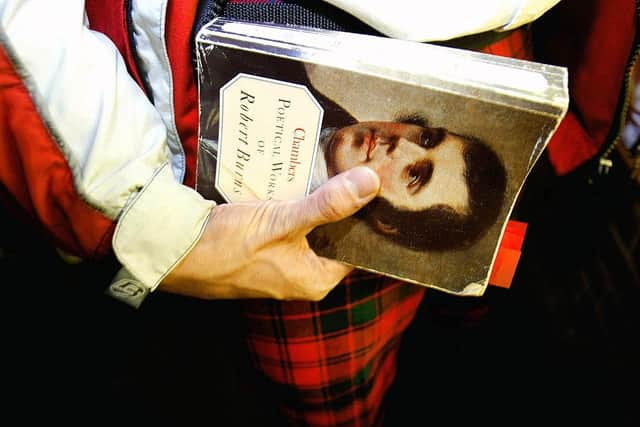Who was Robert Burns? Birthplace, life and career of Scotland’s national poet as we celebrate Burns Night 2021
Scotland is celebrating the life of its national poet, Robert Burns.
Every year on the 25th January, the day of his birth, Scots hold suppers complete with haggis, neeps and tatties, reciting the bard’s most famous poems.
Advertisement
Hide AdAdvertisement
Hide AdHere's everything you need to know about one of the nation’s most famous sons.


Where was Robert Burns raised?
Robert Burns was born on 25 January 1759, the first of seven children to parents William Burnes and Agnes Broun.
The family lived in a small cottage built by Robert’s father, on the banks of the River Doon in Alloway, just two miles south of Ayr.
Both William and Agnes are credited equally with helping to shape their son’s future path.
Robert’s love for poetry came from his mother. Agnes couldn’t read or write but she would frequently recite traditional folk songs and love ballads to her son.
William, a tenant farmer of modest education, taught his children how to read and write and paid for Robert’s tuition.
At the age of 15, Robert composed his first song ‘Handsome Nell’ for Nellie Kilpatrick, a young girl who he formed a close bond with while working the harvest. The song’s message of unspoken love would feature prominently throughout Burns’ career.
What were Robert Burns’ political leanings?
In the early 1780s Robert moves to Irvine in North Ayrshire to learn flax-dressing. It is recorded that William Burnes was a Jacobite sympathizer, and some of this radical spirit must have rubbed off on his eldest son, for upon arriving in Irvine Robert Burns becomes a freemason. His political leanings will influence many of his greatest works for years to come.
Advertisement
Hide AdAdvertisement
Hide AdRabbie’s passion for creating beautiful poetry grows by the day. By the end of his life he will have authored close to 350 songs – most of which will be published without fee.
Was Robert Burns married?
In 1784 he meets Jean Armour. They would eventually marry and start a family together, but not before Robert fathers his first children with his mother’s servant Elizabeth Paton, and engages in a string of flings with the likes of Margaret Campbell, AKA ‘Highland Mary’ and Agnes McElhose, AKA ‘Clarinda’.
At age 27 Burns’ first official work ‘Poems, chiefly in the Scottish dialect’ is published. It sells out in a matter of weeks.
Despite inheriting the family farm following his father’s death in 1784, Robert experiences severe financial difficulties. This, and a growing list of personal scandals, leads Burns to seriously consider emigrating to the West Indies to work as a bookkeeper on a plantation, but instead he is persuaded to stay and makes his way to Edinburgh in a bid to develop his career and publish more of his work.
It turns out well for him, and by 1787 he has published his second edition of poems. Burns is now regarded as one of the finest poets in the country, and he hasn’t even turned 30 yet.
When did Burns write his most famous poems?
A year later Burns, having spent much of his poetry earnings, decides to return to farming and takes a lease on a farm at Ellisland near Dumfries. However, the venture fails and Burns becomes a full-time exciseman in 1791 in order to support his growing family.
While in Dumfriesshire, Burns writes a number of his most exceptional and well-known works, such as Auld Lang Syne, Tam O’Shanter, and Ae Fond Kiss.
When did Robert Burns die?
Burns died aged just 37 in 1896 having contracted rheumatic fever after falling asleep at the roadside in pouring rain. His youngest son Maxwell is born on the day of his funeral.
Advertisement
Hide AdAdvertisement
Hide AdIn 1815 Burns remains are relocated to a lavishly-built mausoleum. His mother, Agnes Broun, who lived to the ripe old age of 88, is reported to have remarked: “Ah, Robbie, ye asked them for bread and they hae gi’en ye a stane”.